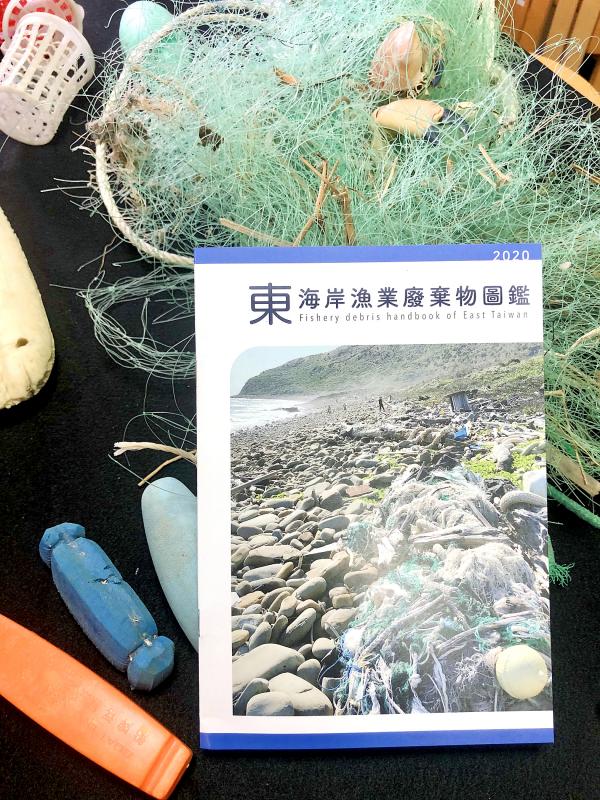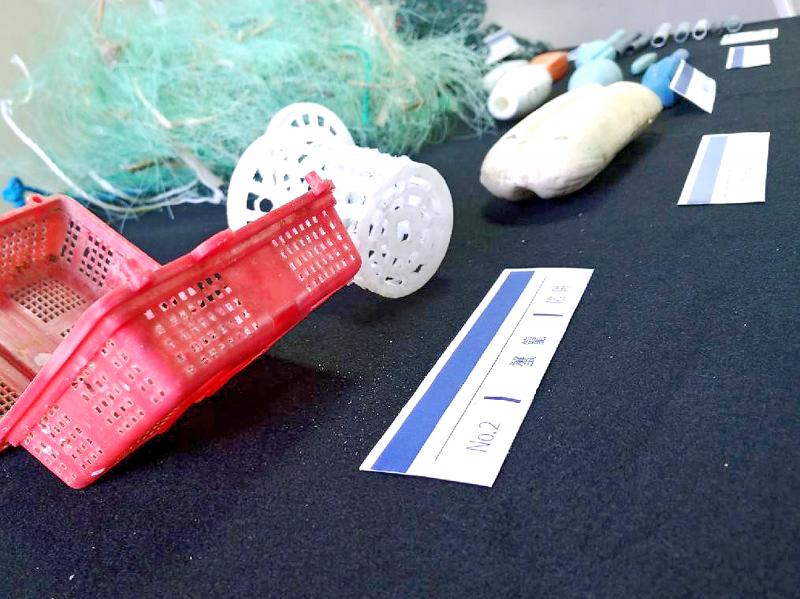The Kuroshio Ocean Education Foundation yesterday held a news conference in Taipei to highlight the environmental dangers posed by fishing waste and urge the government to take swift and systematic action.
Forty environmentalists from the foundation and environmental consultancy IndigoWaters Institute surveyed 19 coastal communities to produce the nation’s first illustrated report on fishing waste, finding that gillnets pose a particularly urgent threat to marine ecology.
While the Environmental Protection Administration is in charge of onshore waste produced from daily consumption, there is no systematic disposal among government agencies of waste fishing gear that poses a danger to marine life, foundation executive director Chang Hui-chun (張卉君) said.

Photo: Lo Chi, Taipei Times
The Hualien-based foundation over the past year worked with IndigoWaters to document the fishing gear that is often discarded nationwide and interview fishers at ports in eastern Taiwan to produce the report, she said.
With the handbook, they hope to understand fishers’ use of the gear, raise public awareness about the impact of abandoned gear and prompt more government action to tackle the problem, Chang said.
About half of the nation’s fishing boats, including most independent fishers, practice near-shore gillnetting, with 7,662 boats engaged in the practice full-time and 2,524 boats using it part-time, the Ocean Conservation Administration (OCA) said.

Photo: CNA
Discarded fishing gear could pose a threat to navigation safety or become “ghost nets,” trapping more marine animals that are attracted by fish stuck on the nets, institute executive director Yen Ning (顏寧) said.
They could also decompose into microplastic debris, absorb persistent organic pollutants or release toxic substances in the water, she added.
For the report, Yen interviewed fishers at 14 ports along the east coast who told her that some of their colleagues would purposefully throw old nets into the ocean, but most are concerned about environmental issues and told the researchers which nets were from Taiwanese fishers and which washed in from elsewhere.
Of more than 100 tonnes of garbage collected from waters near Taiwan last year, waste fishing gear made up 60 tonnes — the most among all garbage, she said, citing OCA data.
In January, a 24m-long dead blue whale washed ashore on Taitung County’s coast, and the creature was entangled in fishing nets and might have starved to death, she said.
Nearly 10 percent of sea turtles stranded on Taiwan’s shores were found entangled in fishing nets as well, she said, calling for better management of such marine trash.
Fisheries Agency Boats Administration Section chief Chiu Yi-hsien (邱宜賢) at the news conference said that the agency on Aug. 31 released draft regulations on gillnetting to be implemented in July next year.
According to the new measures, a fishing boat’s registration number must be displayed on each of the net’s buoys, which are placed at 50m intervals, Chiu said.
If fishers are unable to recover a net, they must notify government authorities, who would clear the debris and keep track of hotspot areas, he said, adding that the fisher would not be punished if authorities fail to recover the net.
However, those who fail to identify their gear when fishing would face a fine of NT$30,000 to NT$150,000, he said.
Fishers who lose their gear, but do not report to local authorities would face the same fine, he added.
Separately, the OCA said it has commissioned New Taipei City, Chiayi County, Taoyuan and Keelung governments to collect waste fishing gear, analyze their components and calculate the costs needed for their recycling and reuse.
It has also commissioned Penghu and Kinmen county governments to use polystyrene foam reduction facilities donated by Lite-On Technology Corp to boost the disposal efficiency of such waste, the OCA said.
The two measures would be promoted in other municipalities if they prove feasible, it said.

A decision to describe a Chinese Ministry of Foreign Affairs statement on Singapore’s Taiwan policy as “erroneous” was made because the city-state has its own “one China policy” and has not followed Beijing’s “one China principle,” Deputy Minister of Foreign Affairs Tien Chung-kwang (田中光) said yesterday. It has been a longstanding practice for the People’s Republic of China (PRC) to speak on other countries’ behalf concerning Taiwan, Tien said. The latest example was a statement issued by the PRC after a meeting between Singaporean Prime Minister Lawrence Wong (黃循財) and Chinese President Xi Jinping (習近平) on the sidelines of the APEC summit

Taiwan’s passport ranked 34th in the world, with access to 141 visa-free destinations, according to the latest update to the Henley Passport Index released today. The index put together by Henley & Partners ranks 199 passports globally based on the number of destinations holders can access without a visa out of 227, and is updated monthly. The 141 visa-free destinations for Taiwanese passport holders are a slight decrease from last year, when holders had access to 145 destinations. Botswana and Columbia are among the countries that have recently ended visa-free status for Taiwanese after “bowing to pressure from the Chinese government,” the Ministry

‘SIGN OF DANGER’: Beijing has never directly named Taiwanese leaders before, so China is saying that its actions are aimed at the DPP, a foundation official said National Security Bureau (NSB) Director-General Tsai Ming-yen (蔡明彥) yesterday accused Beijing of spreading propaganda, saying that Chinese President Xi Jinping (習近平) had singled out President William Lai (賴清德) in his meeting with US President Joe Biden when talking about those whose “true nature” seek Taiwanese independence. The Biden-Xi meeting took place on the sidelines of the APEC summit in Peru on Saturday. “If the US cares about maintaining peace across the Taiwan Strait, it is crucial that it sees clearly the true nature of Lai and the ruling Democratic Progressive Party (DPP) in seeking Taiwanese independence, handles the Taiwan question with extra

HEALTHCARE: Following a 2022 Constitutional Court ruling, Taiwanese traveling overseas for six months would no longer be able to suspend their insurance Measures allowing people to suspend National Health Insurance (NHI) services if they plan to leave the country for six months would be abolished starting Dec. 23, NHIA Director-General Shih Chung-liang (石崇良) said yesterday. The decision followed the Constitutional Court’s ruling in 2022 that the regulation was unconstitutional and that it would invalidate the regulation automatically unless the NHIA amended it to conform with the Constitution. The agency would amend the regulations to remove the articles and sections that allow the suspension of NHI services, and also introduce provisional clauses for those who suspended their NHI services before Dec. 23, Shih said. According to